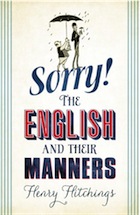 I loved the dry wit in the final sentence of this paragraph of a book I have for bed-side reading, Sorry! The English and Their Manners by Henry Hitchings:
I loved the dry wit in the final sentence of this paragraph of a book I have for bed-side reading, Sorry! The English and Their Manners by Henry Hitchings:
Beside the encounters I’ve so far dealt with, there is another kind of meeting: a formal assembly. In the Middle Ages meetings were armed encounters: local disputes were settled by means of a ‘moot’ at which proposals were approved with a banging together of weapons — or dismissed with groans. These attempts to negotiate arguments gradually became less military in temper. During the Renaissance, urbanization and political centralization gave rise to a more parliamentary style of meeting, over which courtiers presided. Urbane discussion became the mechanism for resolving or curtailing differences and achieving solidarity. Yet even in the nineteenth century the word meeting was a euphemism for a duel — a hangover from a less bureaucratic age. And today meeting is associated with other ways of taking lives or at least sapping vitality. (pp. 50-51)
How can any discussion of the pain of meetings avoid the old John Cleese classic . . .
[youtube=https://www.youtube.com/watch?feature=player_detailpage&v=ZWYnVt-umSA]
Neil Godfrey
Latest posts by Neil Godfrey (see all)
- Questioning the Hellenistic Date for the Hebrew Bible: Circular Argument - 2024-04-25 09:18:40 GMT+0000
- Origin of the Cyrus-Messiah Myth - 2024-04-24 09:32:42 GMT+0000
- No Evidence Cyrus allowed the Jews to Return - 2024-04-22 03:59:17 GMT+0000
If you enjoyed this post, please consider donating to Vridar. Thanks!

Personal request Neil.
Ms mcduff is thinking of starting up her own blog on WordPress and I wondered if you would be willing to pass on advice based on your experiences with a blog and WordPress in particular of some do’s and don’t and recommended practices ? Please.
Back to your meeting.
Hosting on WordPress.com is not a bad place to start. You’re insulated from a lot of the unpleasant code that lies beneath the surface, which can be good and bad. On the plus side, she won’t have to worry about uptime. And as Neil pointed out if she ever runs up against problems, she can tap into the huge number of users who haunt the discussion boards.
I harbor no ill will against the WordPress people. The DMCA is a bad law enacted to protect the property rights of the plutocrats. We just happened to get rolled over by the machinery.
Thank you, to both.
I found wordpress.com very easy to get started with and on the whole the support was good. But just before I left I think it was getting harder to directly email tech support — always getting redirected to forums to solve problems. They’re pretty active and helpful, too, I found — but I only had very few issues that arose because I was trying to do something a bit out of the ordinary. I can’t even recall what now.
There are lots of theme choices to select from and so long as Ms McDuff does not quote anything from Joel Watts’ blog to show what a complete fool he is she should have no problems.
Tim may have other thoughts.